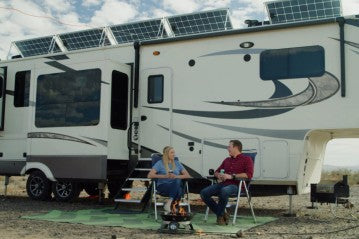
Congratulations! You've taken the first step towards embracing renewable energy by considering a solar energy system for your home. Among the essential components of such a setup, a 3000W inverter and a 12V solar battery are key players that demand your attention. In this blog post, we'll delve into the intriguing world of solar batteries and inverters, answering the burning question on every potential solar energy enthusiast's mind: How long will a 12V battery last with a 3000W inverter?
1. Understanding the Basics: Solar Battery and Inverter
Before we dive into the nitty-gritty of battery life calculations, let's brush up on the fundamentals.
1.1 Solar Battery
In a solar energy system, a solar battery plays the role of a reservoir, storing the excess energy generated by solar panels during sunny days. It ensures that you have a consistent and reliable power supply even during cloudy or nighttime periods. Batteries come in various voltages, and a 12V battery is a popular choice for residential solar setups due to its versatility and ease of maintenance.
1.2 3000W Inverter
A 3000W inverter, on the other hand, is responsible for converting the direct current (DC) electricity stored in the battery into alternating current (AC) electricity, which is what most of our household appliances run on. Its capacity is measured in watts (W) and is a crucial component for powering your devices seamlessly.
2. Factors Influencing Battery Life
Now that we understand the basic players in the solar energy game, let's explore the various factors that can impact the longevity of a 12V solar battery when paired with a 3000W inverter.
2.1 Battery Capacity
The capacity of your 12V solar battery is a critical determinant of how long it can power your devices. The capacity is usually measured in ampere-hours (Ah) and indicates the amount of electricity the battery can provide over a specific period. A higher capacity battery can store more energy, leading to longer backup times.
2.2 Inverter Efficiency
Inverter efficiency plays a significant role in the overall energy utilization of your system. A 3000W inverter with higher efficiency will waste less energy during the conversion process, resulting in better battery performance and longer backup durations.
2.3 Load Size and Usage Pattern
The load size, i.e., the total power consumption of your connected devices, directly impacts battery life. Running power-hungry appliances continuously will drain the battery faster than using energy-efficient ones or employing smart usage patterns.
2.4 Depth of Discharge (DoD)
The Depth of Discharge refers to the amount of a battery's capacity that has been used. A deeper discharge can put more strain on the battery, reducing its overall lifespan. It is advisable to avoid discharging the battery below 50% (DoD) to ensure it lasts longer.
2.5 Climate and Temperature
Climate and temperature can have a substantial effect on battery performance. Extremely high or low temperatures can decrease the battery's efficiency and capacity, affecting how long it can power your appliances.
3. Calculating Battery Life: A Simple Equation
Let's address the primary question: How long will a 12V battery last with a 3000W inverter? To calculate this, we need to consider the battery capacity and the power consumption of your devices.
3.1 Battery Life (in hours) = Battery Capacity (Ah) / Total Load (in amps)
Suppose your 12V solar battery has a capacity of 200Ah, and your total connected load consumes 100 amps of current. Using the formula, the battery life can be calculated as follows:
Battery Life = 200Ah / 100A = 2 hours
Remember, this is a basic estimate, and several other factors mentioned earlier will come into play to fine-tune the actual battery life.
Conclusion
Choosing the right solar battery and inverter is essential to ensure a smooth and uninterrupted supply of clean energy for your home. A 12V battery paired with a 3000W inverter can provide you with reliable backup power for a range of applications. However, to maximize the battery life, consider factors such as battery capacity, inverter efficiency, load size, depth of discharge, and environmental conditions.
By making informed decisions and adopting smart energy consumption practices, you can optimize the longevity of your solar battery and inverter, bringing you one step closer to a sustainable and eco-friendly future.
Embrace solar energy today, and let your home bask in the brilliance of renewable power!

0 Kommentare